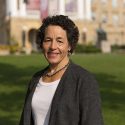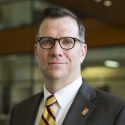Smeeding brings expertise to poverty research institute
Tim Smeeding knows something about horses, and about success.

Smeeding
He strides to his office chalkboard, and in an animated style, picks up a piece of chalk and starts scribbling away. An equation comes into view: “Success = an idea, the money, and the horses to get it done.”
Smeeding, the new director of the Institute for Research on Poverty (IRP), has lived out that equation many times.
Notably, he used it as the founder of the Luxembourg Income Study (LIS), an international trove of data on wealth, the labor market and demographic information encompassing more than 30 nations.
“It’s the gold standard. If people are going to compare country A and B with respect to poverty and equality and economic well-being, they want to know what LIS says, ” says Smeeding, who directed the study for 23 years. “We learn what works and what doesn’t from those comparisons.”
“One thing we learned was that if a country makes it a priority, they can do something about poverty.”
Smeeding
The LIS is mainly funded by the national science and social science research foundations of its member countries and now boasts datasets from 34 countries. The news media regularly cite the study as the most reliable source of comparable data on inequality and poverty across rich nations.
“One thing we learned was that if a country makes it a priority, they can do something about poverty,” Smeeding adds. “In England, Gordon Brown and Tony Blair were able to halve absolute poverty within 10 years by making poverty reduction a national goal and devoting 1 percent of national income to that goal.”
Now, Smeeding’s equation is coming into play at the institute, which for 42 years has provided the scholarship and the outreach to address the causes and effects of poverty on a national scale.
Although Smeeding came to IRP from Syracuse University, he earned master’s and doctorate degrees in economics at UW–Madison and has been one of IRP’s research affiliates since 1980. He was the co-organizer of the institute’s 40th anniversary celebration in 2006.
“Being involved with that event gave me a chance to see how much has been accomplished, but also a window on how much still needs to be done,” he says. “This country really doesn’t treat its poor people very well. We tell them to go to work, and they’ve gone to work. But if you work full time and pay your taxes and have the same values as the rest of us, you shouldn’t be poor. Unfortunately, many people in this country do play by the rules, and they’re still poor.”
Smeeding, who is also on the faculty at the La Follette School of Public Affairs, knows the value of establishing and maintaining contacts between academics and the practitioners who are working each day to eliminate poverty. He also values the Wisconsin Idea and believes that the institute plays a crucial role in bringing university knowledge to Main Streets across the state and beyond.
“We want to be the leaders in academic scholarship in the causes and costs of poverty,” Smeeding says. “I feel that I’m also here to fulfill the Wisconsin Idea — a public university making the lives of the state’s residents better. We shouldn’t be isolated from the problems of the state. We should be part of the solution.
“My role of improving the lives of people in the state is to try to help reduce the number of poor people and help make their lives more stable and their children healthier, so when we compare the U.S. and U.K., we look better,” Smeeding adds.
His work with the Luxembourg Income Study earned Smeeding an honorary doctorate from Stockholm University, where he was honored this fall alongside Swedish musician Benny Andersson, of the pop group ABBA.
Smeeding’s research focuses on the economics of public policy, especially social policy and at-risk populations; national and cross-national comparisons of income and wealth inequality; poverty; social policy; and social mobility. But his goal as the institute’s new director is delivering change.
“The university can help the state in terms of the problems it has with poor families and children,” he says. “I hope there will be change and I’d like very much to say that I helped the institute make a difference of the lives of people, including those in the state of Wisconsin. We’re part of the Wisconsin Idea.”



